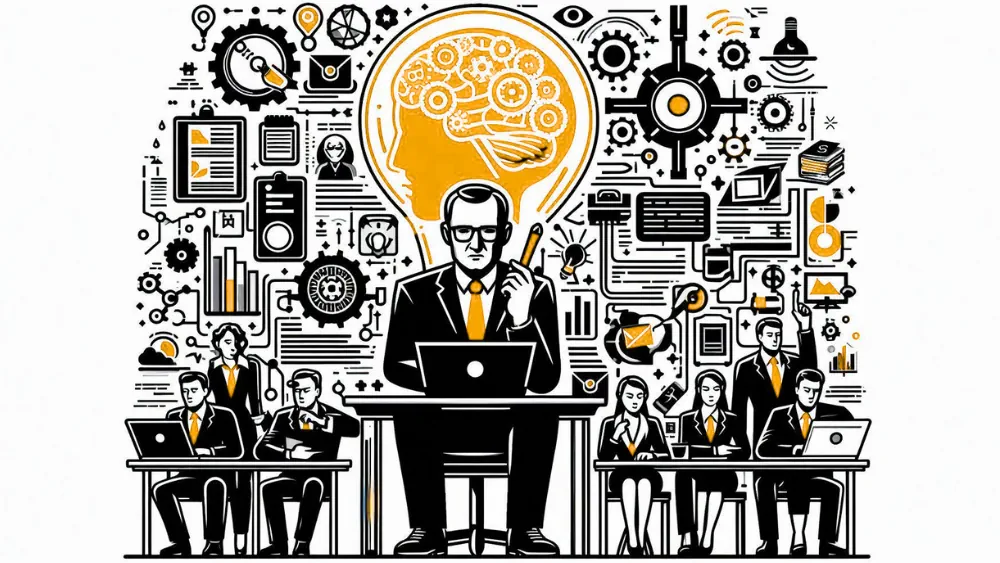 illustration: Bing AI
illustration: Bing AIForrester Research’s report, Predictions 2025, emphasizes that companies’ main goal will be to draw valuable insights from previous trial and error to accelerate long-term growth.
Pressure for Quick ROI on AI Investments
Generative AI market leaders recognize the need for a strategic approach to managing AI investments.
- In 2024, 49% of AI decision-makers in the U.S. expected a return on AI investments within one to three years,
- while 44% anticipated ROI within three to five years.
This pressure for rapid returns often leads enterprises to prematurely scale back investments. Forrester suggests that instead of focusing solely on quick returns, AI leaders should create a balanced plan that leverages company-specific data and unique expertise to maximize both short- and long-term gains.
Reorganizing Marketing and Sales Structures
Forrester also highlights the importance of reorganizing organizational structures, especially in marketing and sales, where only 12% of marketing leaders consider current structures effective for achieving revenue goals. Meanwhile, just 7% believe their teams possess the necessary competencies, making reorganization a vital part of strategic plans for 2025.
However, rather than limiting changes to surface-level adjustments, Forrester encourages companies to pursue fundamental transformations, such as adapting strategies to customer needs and optimizing revenue processes.
Examples of steps companies are taking:
- Moving partner ecosystem marketing directly under the CMO.
- Rotating revenue development reps between sales and marketing.
- Integrating revenue operations under a unified “go-to-market” title.
The Role of Value Networks in Younger Generations’ Buying Process
Millennials and Generation Z are beginning to dominate the B2B buying market, influencing how purchasing decisions are made. Forrester’s study shows that in 2024:
- 30% of younger buyers engaged 10 or more people outside the organization in decision-making,
- with this figure expected to rise above 50% by 2025.
Modern buyers rely on external sources, such as social media and industry networks, prompting B2B marketers to develop capabilities to collaborate with external influencers.
Shift to Digital Sales Channels
Shifts in purchasing preferences, especially among younger generations, are leading to the rise of self-service sales channels. In 2024, 52% of large B2B purchases (worth over $1 million) occurred directly through sales representatives.
However, Forrester predicts that by 2025, more than half of such transactions will take place through self-service channels, such as vendor websites or sales platforms. This shift requires sales teams to serve as advisors, helping clients make informed decisions.
Changes in purchasing preferences:
- Increase in self-service B2B transactions worth over $1 million.
- Sales representatives serve as advisors rather than transaction managers.
Declining Interest in Product-Led Growth (PLG) Strategy
Forrester’s findings show that Product-Led Growth (PLG) remains a priority for 25% of marketing decision-makers. Although PLG generates higher revenue and lower customer acquisition costs, market volatility and budget constraints are reducing interest in this strategy.
In 2025, the percentage of companies using PLG is expected to fall below 20%, as businesses redirect resources to generative artificial intelligence.
The full Forrester report "Predictions 2025: B2B Marketing & Sales" is available at:
https://www.forrester.com/predictions/b2b-2025/
COMMERCIAL BREAK
New articles in section Marketing and PR
Brand visibility in the age of algorithms
Aleksander Pawzun
A few years ago, everything was simpler. It was enough to have a good website, do SEO, run a blog, and publish on social media. Whoever was systematic was visible. Whoever invested in content and positioning gained customers. That world no longer exists.
Queue psychology. Scientists' discovery used in Call Centers
Andrzej Sowula
The discovery first described by psychologists in the second half of 2024 concerns the so-called "relative progress effect". When customers observe fast service at the beginning of their wait, they tolerate slower service much better later in the waiting period.
#POMAGAM2026 Can a New Year's resolution go viral?
wspieramy
Is a million good deeds a lot? Ten-year-old Emilka wants to find out. She just announced the I Resolve to Help campaign on the internet and urges everyone to make a unique New Year's resolution. That we help each other more often in 2026.
See articles on a similar topic:
Dietary Supplements. How to Distinguish Information from Marketing
Ewa Zygadło-Kozaczuk
Where can you find reliable information about dietary supplements, and how can you distinguish factual information from advertising? The answer is not straightforward. In fact, additional doubts arise.
How to reduce food waste? Packaging design matters
KFi
Researchers from China have proven that visual packaging elements and consistent messaging can be effective tools in the fight against global food waste. They published research results showing that designers and marketers can make a real difference.
Poles do not forgive brands' mistakes. Armatis Customer Experience Index
Krzysztof Fiedorek
As many as 57.2% of Poles are willing to abandon a brand after one bad customer service experience. This result is similar to what was noted in the United States. Every third Polish customer prefers phone contact with a consultant, though over 13 percent now prefer chat.
More AI bots in customer service. However, Poles want people
Andrzej Sowula
Over three quarters of Poles (75.9%) have already had contact with a bot in a customer service department and nearly one in four is satisfied with this service. This means an increase of 7.7% over the past two years. At the same time, only 8.1% of Poles fully trust the bots serving them.






























